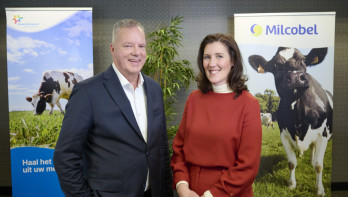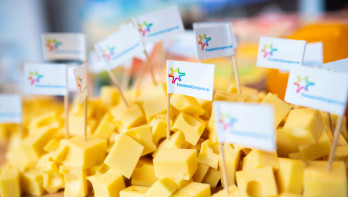News Dairy
FrieslandCampina is going to merge with Milcobel
Dairy cooperatives FrieslandCampina and Milcobel want to merge. The goal of this significant step is to better respond to the challenges and opportunities in the market, where the milk supply is decreasing.
According to their own statements, the merger of FrieslandCampina and Milcobel will create one international and future-oriented organization that can better seize opportunities and address challenges more effectively in the global dairy market.
"The merger of FrieslandCampina and Milcobel is more than the sum of its parts. It creates one future-oriented, common dairy cooperative that is resilient and can seize opportunities in the dynamic, global dairy market," said cooperative chairman Sybren Attema of FrieslandCampina. According to his Belgian counterpart from Milcobel, the deep-rooted cooperative ideology forms the basis of the merger.
Business case not built on site closures
After the merger, the new organization will have a pro forma turnover of more than €14 billion and nearly 22,000 employees worldwide. The milk volume will amount to approximately 10 billion kilograms of member milk (9 billion FrieslandCampina, 900 million Milcobel). This milk is supplied by nearly 11,000 member dairy farms owned by about 16,000 member dairy farmers in the Netherlands, Belgium, Germany, and Northern France.
Although it seems logical that there will also need to be rationalization and cuts in processing capacity with a merger, the CEOs of FrieslandCampina and Milcobel deny that significant costs need to be incurred. "This business case is not built on site closures," said CEO Jan Derck van Karnebeek of FrieslandCampina. The hope is that the new merged company, which is likely to start only by early 2026, will attract new dairy farmers in the coming period, as stated by Milcobel CEO Peter Grugeon.
This includes a focus on Northern France. In Belgium, the milk supply is also shrinking, and like in the Netherlands, there are more companies there looking for milk. Even Danone, which has a history of divesting dairy farmers, is again looking for new dairy farmers in Belgium.
Member councils will have to vote
In the coming months, the member councils of FrieslandCampina and Milcobel will have to vote on the intended merger. Financial details also need to be worked out regarding the inclusion of Milcobel members in the cooperative system of FrieslandCampina. The Milcobel shares must be converted into delivery certificates, and the precise conditions under which they can be exchanged must be clarified.
In terms of milk money, it seems that the Milcobel members will definitely benefit, as FrieslandCampina pays a higher milk price. The Milcobel members will have 2 years to switch to FrieslandCampina's Foqus Planet quality system. Next year, the competition authorities will also have to give their opinion on the merger. Van Karnebeek does not expect major obstacles, but indicates that Milcobel's position in the Belgian cheese market may still be a subject of discussion.
According to the chairpersons Betty Eeckhout and Sybren Attema of both cooperatives, the intended merger has been an option for some time. Eeckhout also did not deny that discussions were held with more parties, but according to her, the conversation between the two only really gained momentum in the last 6 to 8 weeks. "The cooperative DNA and corporate culture" of both parties led to the final connection.

Wouter Baan
© DCA Market Intelligence. Op deze marktinformatie berust auteursrecht. Het is niet toegestaan de inhoud te vermenigvuldigen, distribueren, verspreiden of tegen vergoeding beschikbaar te stellen aan derden, in welke vorm dan ook, zonder de uitdrukkelijke, schriftelijke, toestemming van DCA Market Intelligence.

